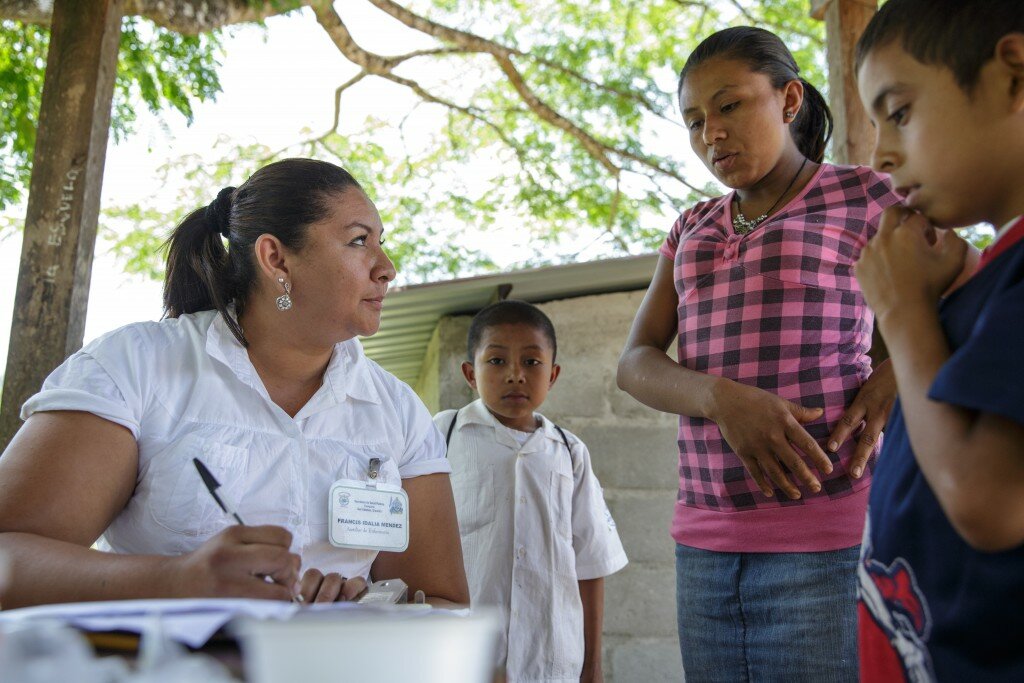
Mission to verify the elimination of onchocerciasis in Ecuador. PAHO/WHO, 2014
I can’t wait to spread the news. The Latin American and the Caribbean (LAC) region is one step closer to seeing the end of onchocerciasis (also referred to as river blindness): Mexico has become the third country in the world to officially wipe out this disease!
The drive for progress is much of what motivated me during my time as the Director of the Pan American Health Organization, the WHO Regional Office for the Americas. I am excited to continue celebrating these milestones as Neglected Tropical Disease (NTD) Special Envoy, and a life-long advocate for public health.
Earlier this year, I wrote about 7 achievable victories in the fight against NTDs that I hope to see accomplished in 2015. Many of these wishes are coming true.
This week, I am filled with the joyful sense of pride in the accomplishment of Mexico and its partners as I check off Mexico’s certification of onchocerciasis elimination from my wish list. Mexico’s success builds off of Colombia and Ecuador’s certification in 2013 and 2014, respectively, and gives me even more confidence that we will soon see news of a LAC region completely free of onchocerciasis.
Onchocerciasis is a devastatingly debilitating parasitic disease that causes itchiness, rashes, and eye problems, eventually leading to permanent blindness. The parasite is transmitted to humans by the bite of a black fly, which breeds in fast moving rivers, increasing the risk of blindness in nearby communities. What’s more, the disease causes a terrible ripple effect by pulling kids out of school to care for their blind elders, reducing economic productivity, and causing families to move out of fertile river valleys, decreasing agricultural outputs in already impoverished areas.
This momentous occasion moves the LAC region one step closer to eliminating the disease entirely—Guatemala has already submitted a request to WHO to verify elimination, and I hope to soon see more results from the enormous, highly coordinated, south-south cooperative effort between Brazil and Venezuela to stop transmission in the Yanomami communities along their borders.
We should all celebrate this official announcement, and we must particularly congratulate Mexico and the many partners that have been working to control this problem for decades and moved toward accomplishing elimination with new tools and new partners for the last fifteen years.
Eliminating this disease requires unwavering determination. The first step in the elimination process is at least two years of mass drug administration, in which entire communities who are at risk of onchocerciasis are administered Mectizan (ivermectin) every six months. Merck has made an unprecedented pledge to donate Mectizan to everyone in need, for as long as needed. President Jimmy Carter and the Carter´s Center program (OEPA – Onchocerciasis Elimination Program for the Americas) have been instrumental, joining PAHO/WHO as well as the communities and health workers in a successful dream team. You can see President Carter’s , congratulating partners for their hard-earned accomplishments.
Once large-scale programs are complete, treatments are delivered to individuals on an as-needed basis. Communities are monitored for an additional twelve years to make sure that transmission of this disease has been interrupted. Finally, after treatment and monitoring, countries stop the treatment intervention and watch for three years to ensure that there is no resurgence in transmission, and then apply for WHO certification that elimination has been achieved.
I was thrilled to be able to celebrate the long-term dedication and resulting accomplishment of all partners contributing to this milestone at an event at PAHO Headquarters last week. Health Ministers from the countries that have eliminated or will soon eliminate river blindness, technical advisors, and global policy leaders were specially recognized for the recent successes and spur motivation to run the race through the last mile all around the world. I was particularly moved when Dr. Etienne, Director of PAHO/WHO, when she received the award. The outstanding accomplishment of the countries in the Americas comes at an excellent time, now that NTDs are officially identified in the recently adopted Sustainable Development Goals. The LAC region has hit the ground running.
Dr. Mirta Roses Periago is the Director Emeritus of PAHO/WHO and a Special Envoy for the Global Network for Neglected Tropical Diseases

